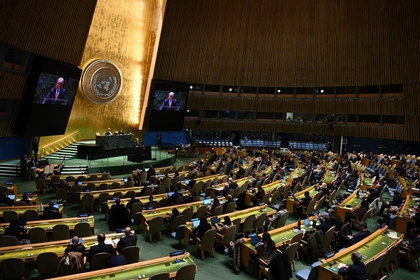Wagner is now part of the National Guards of Russia (Rosgvardiya), said an official Wagner statement in late October, while Russian sources have claimed that Pavel Prigozhin, son of the deceased Wagner leader Yevgeny Prigozhin, had taken over the operations.
Not much is known about Pavel Prigozhin, but Russian sources claimed that he joined the military at a young age and fought as a mercenary under the Wagner banner. His Telegram channel seems to have corroborated the latter claims.
JOIN US ON TELEGRAM
Follow our coverage of the war on the @Kyivpost_official.
A picture shared by Gray Zone, a Telegram channel affiliated with Wagner, has shown Prigozhin’s alleged will prior to his death that bequeathed his assets to Pavel.
Yevgeny Prigozhin, alongside the senior leadership of Wagner, died in a plane crash in August. Many speculated the incident to be an assassination carried out by Russian authorities in response to the Wagner mutiny in June.
Wagner’s incorporation into Russia’s National Guards means that it will now report directly to Russian President Vladimir Putin. The changes could be interpreted as the Kremlin’s attempt to tighten its grip over private militaries after the mutiny.
Wagner’s command structure remains unchanged, according to the official statement, and it has resumed recruitment and provided the salary ranges for different positions.
However, the announcement ended with a hostile message to some former Wagner fighters.

US Urges Backing of ‘Simple’ UN Resolution as Trump Calls for Putin-Zelensky Talks
“Persons who transferred from the Wagner Group to the structures of the Ministry of Defense and the subject volunteer detachments will not be accepted back!” read the statement.
This could be interpreted as the lingering effects of the feuds between Wagner and the Russian Ministry of Defense preceding the June mutiny.
A British Intelligence report published today corroborated the claims. It added that former Wagner fighters have likely joined Redut, a mercenary fighting force under the control of Russia’s intelligence service, while some medics have joined the Chechen “Akhmat” special forces.
On Nov. 6, Chechen leader Ramzan Kadyrov said ex-Wagner fighters had trained with his “Akhmat” forces, and praised the Wagner fighters for their “excellent combat experience” in a Telegram update.
Kadyrov condemned the Wagner mutiny and offered his troops to help suppress the rebellion. However, he also expressed condolences upon Prigozhin’s death and said they had “a lot in common” but described the mutiny as Prigozhin’s inability to see “the greater picture.” Kadyrov also called Prigozhin’s death a “great loss for the entire state.”
As of September, Wagner continued to operate in Africa. What the change in leadership entails for Wagner’s African operations remains unclear.
You can also highlight the text and press Ctrl + Enter











